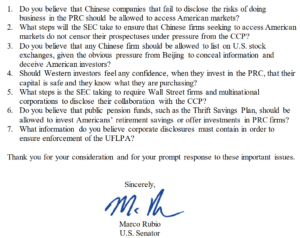Senator Marco Rubio (R-FL) wants to know what the Securities and Exchange Commission (SEC) is doing to protect investors from what increasingly looks like a purposeful move on the part of Beijing to conceal information about China companies listed on the Shanghai and Shenzhen stock exchanges.
In a letter sent to SEC Chairman Gary Gensler on Aug. 11, Rubio wrote that he was concerned about news reports claiming China was “pressuring firms to conceal information about the risks of doing business in China. If true, this effort is a direct challenge to American law and securities regulations.”
Beijing is currently censoring social media posts about “deflation” in China in an effort to control “the narrative” of the world’s No. 2 economy. The Financial Times reported that local economists were being told not to be negative about China’s post-Zero Covid rebound. It is, therefore, not a far leap to go from pressuring economists on the economy to pressuring state-owned enterprises from revealing anything negative about their financials. This might also go for important private firms who have long been seen as China’s best, Western-facing enterprises, like Alibaba, for example.
In his letter to Gensler, Rubio highlighted a Reuters article dated July 24 saying the Chinese Securities Regulatory Commission (CSRC) had supposedly convened a secret meeting with ten Chinese law firms, including Fangda Partners, Han Kun Law Offices, and Zhong Lun Law Firm, to offer informal guidance about Chinese firms seeking initial public offerings (IPOs) overseas. According to that article, CSRC told these law firms not to sign off on offshore IPO documents that require risk disclosures, which would mean restrictions on the macro risks of doing business in China rather than just the standard risks of investing in the company itself.
This runs against the 2020 Holding Foreign Companies Accountable Act, a law that requires the SEC to delist Chinese companies that are not in compliance with the Public Company Accounting Oversight Board’s regulations. Chinese companies, especially state-owned ones, have not followed this statute for years. Members of the Board visited China this year to discuss finally getting Chinese-listed entities with the program, but now it appears the CSRC is telling newcomers to ignore disclosures.
“The SEC has provided guidance elaborating on these disclosure requirements. Now, the CCP is instructing its firms to ignore those disclosure requirements and violate our laws. Such a challenge to U.S. authority and threat to U.S. investors demands a response,” Rubio told Gensler.

From the letter to SEC Chairman Gary Gensler dated Aug. 10, 2023 by Senator Marco Rubio.
Rubio has been part of a handful of Senators who are pushing the Federal government to closely monitor or outright ban investments in China. Rubio was joined by Sen. Jeanne Shaheen (D-NH) to pressure the Federal Retirement Thrift Investment Board to ban China securities from the investment offerings given to federal employees.
As it is now, U.S. Army generals and retired Commerce Department employees, among others, are investing untold billions of dollars in companies that Commerce has put on export restriction lists or who are banned from selling goods to the United States by the Department of Homeland Security.
According to data published by CPA, and that was reported on by The Wall Street Journal and Newsweek, the Thrift Savings Plan – the roughly $700 billion retirement plan for federal employees and the military – has serious exposure to companies owned or controlled by the Chinese Communist Party. As such, “[m]illions of federal employees can invest in Chinese companies sanctioned by the U.S. government via its flagship retirement plan, even though these companies have been branded a danger to national security or are accused of profiting from forced labor or other human rights abuses.”
These companies are not in compliance with U.S. financial auditing rules, for one. And on the other hand, some of them are on Entity Lists and face trade restrictions but are somehow allowed to soak up hundreds of millions of dollars in American retirement savings.
Earlier this month, Homeland added two new companies to its Uyghur Forced Labor list of banned entities. One company, Chenguang Biotechnology Group Yanqi Co., believed to be using forced labor or prison labor from Xinjiang province, is a holding of USAA mutual funds. USAA sells financial services and products almost exclusively to people who served in the military, as CPA noted here on Aug. 3.
Roger Robinson, an advisor to CPA, former National Security Council (NSC) Senior Director of International Economic Affairs for President Ronald Reagan, and former Chairman of Congressional U.S.-China Economic and Security Review Commission, told a House committee this spring that Wall Street’s money flow was the “biggest, strategic scandal in modern history.”
“That scandal consists of the multi-trillion dollar underwriting by a democracy, our democracy, by a regime, China, that is bent on undermining our values and way of life,” Robinson said. “There are 100 million Americans invested in the securities of sanctioned Chinese companies and other corporate bad actors. Scores of American investors face debilitating, if not material, financial losses.”
Watch the Robinson clip here: https://www.youtube.com/watch?v=yxtJ5CqyM70













